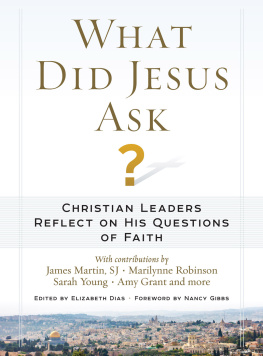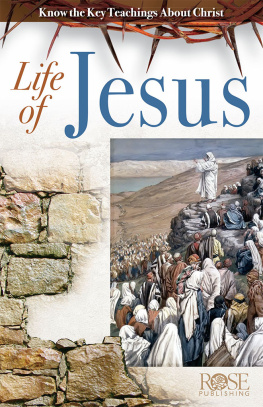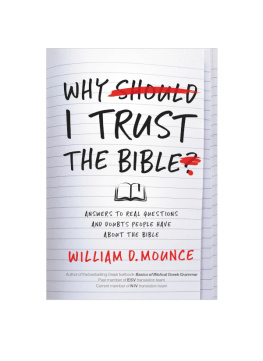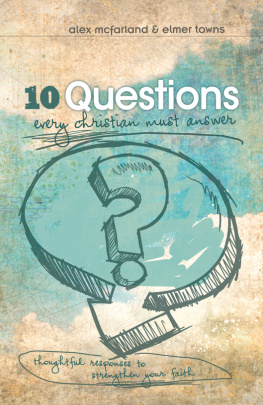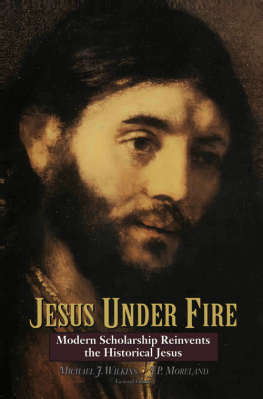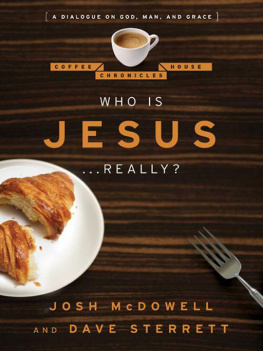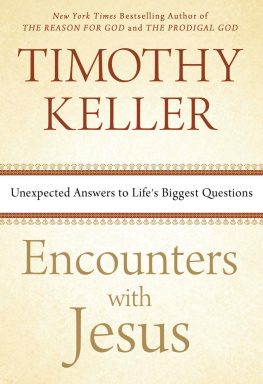What
Did Jesus
Ask?
Geodes, by Carrie Newcomer, 2008 Carrie Newcomer Music (BMI), Admin. BMG/Chrysalis.
Holy as the Day Is Spent, by Carrie Newcomer, 2001 Carrie Newcomer (BMI), Admin. BMG/Chrysalis.
To Love You Back, written by Jamie Grace Harper, Gabe Patillo and Dave Wyatt, 2013 Universal MusicBrentwood Benson Tunes (SESAC)/Songs of Third Base (SESAC), Universal MusicBrentwood Benson Songs (BMI), Universal MusicBrentwood Benson Publishing (ASCAP)/Songs of Emack (ASCAP), Adm. by CapitolCMGPublishing.com.
See What a Morning, by Keith Getty and Stuart Townend, 2003 Thankyou Music (PRS), Adm. worldwide at CapitolCMGPublishing.com excluding Europe, which is adm. by Integritymusic.com.
Christ Is Risen, He Is Risen Indeed, by Keith Getty, Kristyn Getty and Ed Cash, 2012 Getty Music Publishing/Alletrop Music (both administered by Music Services) BMI.
The Holy Bible, New International Version, NIV; 1973, 1978, 1984, 2011 by Biblica Inc. All Rights Reserved Worldwide.
Copyright 2015 by Time Inc. Books
Published by Time Books, an imprint of Time Inc. Books
1271 Avenue of the Americas, 6th floor New York, NY 10020
All rights reserved. No part of this book may be reproduced in any form or by any electronic or mechanical means, including information storage and retrieval systems, without permission in writing from the publisher, except by a reviewer, who may quote brief passages in a review. TIME and the Red Border design are protected through trademark registration in the United States and in the foreign countries where TIME magazine circulates.
ISBN 13: 978-1-61893-321-8
Library of Congress Control Number: 2015939594
We welcome your comments and suggestions about Time Inc. Books. Please write to us at:
Time Inc. Books
Attention: Book Editors
P.O. Box 361095
Des Moines, IA 50336-1095
If you would like to order any of our hardcover Collectors Edition books, please call 800-327-6388, Monday through Friday, 7 a.m.9 p.m. Central Time.

CONTENTS
NANCY GIBBS
FOREWORD
T his book was born of a conversation between a journalist and a surgeonpeople, you might say, for whom questions matter. The doctor looking to diagnose, the journalist looking to discover, believe that in the strength and sharpness of the question lies the possibility of a meaningful answer, one that shines light or breaks ground. I cant remember when it was that my friend Dr. Scott Haig first raised the topic of the questions Jesus asked, but I remember being intrigued, particularly since in this case the questions are of a wholly different nature. On the one hand, people of free will can answer them any way they choose; on the other, an all-knowing God already knows the answer. So why ask?
Why ask? is a question about questions, and that is the theme this book explores, through the eyes, insights and experiences of more than 70 theologians from many schools of Christianity. Perhaps we reflexively associate teachers and preachers with answers when we should really think about questions. The best teachers treat interrogation as navigation, holding back the shortcuts and letting the listeners explore so that upon arrival at an answer, theyve brought the muscles built by the journey.
Put Jesus on a grassy mountainside or in a boat just off the beach with thousands of listeners and he preached: stories and parables, announcements, warnings. But listen to him talking with those closest to him and what we hear are questions. Yes, he was the son of a culture that talked like that, questions answered with better questions, which stymied critics and inspired disciples. But Jesus was neither an academic nor given to argument for its own sake. His mission was to give, some say to be, an answer.
Throughout his life, Jesus used questions to show people who he was. The earliest question comes from a curiously nonplussed little boy, lost for three days in a teeming city, to the frantic mother who had just found him in the temple.
Why were you searching for me? Jesus asks Mary. Didnt you know I had to be in my Fathers house?
She obviously didnt. But Mary and the many who loved him soon learned why from this and the many other questions, and answers, that Jesus spoke. His questions, like the parables, fly under our mental radar and right in, dividing bones and marrow, challenging us not just to answer but to ask why the question needed to be posed at all.
Sometimes the question answers itself: You of little faith, why are you so afraid? (Mathew 8:26). Sometimes the question is the answerparticularly the last, agonizing one from the Cross, asked of God himself: My God, my God, why have you forsaken me? This final question, when Jesus expresses those most human of spiritual conditionsfear, doubt, lonelinessgoes to the heart of the Gospel message: that God, though it may at times appear otherwise, has not forsaken us.
The curation of this anthology is the work of Elizabeth Dias, TIMEs religion writer. While people of many faiths have valuable insights into Jesus and his ministry, this collection was drawn from authors who self-identify as Christians. Within that tradition we sought diversity: the collection is ecumenical, uniting writers whose Christian spheres could not be more different. The contributors are Catholics, mainline Protestants, evangelicals and Eastern Orthodox; men, women, LGBT, straight, black, white, Latino and Asian; musicians, painters, essayists, poets, theologians, producers, preachers and nuns. We found them everywhere from Gulu, Uganda, to Londons Lambeth Palace to a farm in northeastern Georgia in the American South.
These questions invite the reader to imagine, to question and to participate in stories beyond ourselves. Each author sparks new life into words weve heard countless times.
Often we think of Jesus as a spiritual informer. But his questions show him to be a human inviter. His questions, when gathered together, form their own powerful poem. Humans ask things of the divine all the time, but what did God ask us? Why? What does that mean? Questions about questions can open new frontiers even as we explore the most familiar territories.
Nancy Gibbs is the editor of TIME and a co-author of two best-selling books: The Presidents Club: Inside the Worlds Most Exclusive Fraternity and The Preacher and the Presidents: Billy Graham in the White House.
ELIZABETH DIAS
INTRODUCTION
J esus questions can be easy to miss if you arent looking for them. It is only when you pause in the forest of his teachings that they appearlike birds camouflaged in the treetops, ready to take flight. And once you spot them, they command your attention, taking you with them as they dart to new branches, sing new melodies and land where you might not expect.
What Did Jesus Ask? is a new collection of these movements and songs as observed by todays best-known disciples, as each pauses to ponder a question Jesus asked in the Gospels. These pages feature storied voicesEcumenical Patriarch Bartholomew, Sarah Young, Otis Moss III and Marilynne Robinsonand rising onesNeichelle R. Guidry, founder of shepreaches, a development organization for millennial African-American women in ministry; Carrie Newcomer, a Quaker songwriter; and Archbishop Blase J. Cupich, Pope Francis appointee in Chicago.
Contributors chose which of Jesus questions they wanted to consider, and everyone had the same instructions: to reflect on the question itself, not on an answer to it, and to envision the question in a modern way. Beyond that, we left the authors to their own imaginations, and the results are as diverse as the traditions from which the authors come. Cardinal George Pell, who is overhauling the Vaticans financial system, draws on the words of Pope John Paul II. Gene Luen Yang, a graphic artist writing Superman for DC Comics, designs a comic strip exploring Jesus facial expressions. Walter Brueggemann, an Old Testament scholar, writes a poem. Theologian Grace Ji-Sun Kim reflects on her mothers battle with cancer.
Next page
